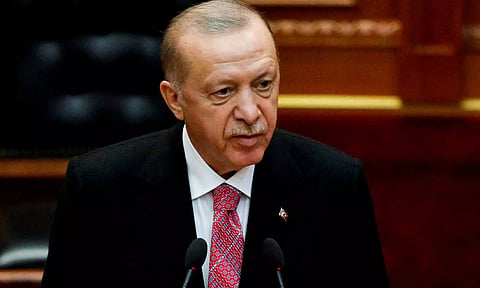

NEW DELHI: This week, Turkish President Recep Tayyip Erdogan celebrated an election win that lengthened his regime into a third decade. The opposition, which was once confident about victory, braced for ‘difficult days ahead’, pitted against an increasingly autocratic government. Rival candidate Kemal Kilicdaroglu remarked it was the most unfair election in years, but did not dispute its outcome. It gave the Islamic-rooted conservative Erdogan a mandate to pursue policies that have polarised the nation and strengthened its position as a regional military power.
The election was viewed as Erdogan’s biggest political challenge, with the opposition almost certain of unseating him and reversing his policies, after polls revealed a potential chink in his armour – a cost of living crisis, with an estimated 44% inflation, and widespread anger following a devastating quake in February, that left him vulnerable. Kilicdaroglu raced past Erdogan in the May 14 general elections, by polling 44.9% votes, separating the latter from the winning threshold of 50% by a razor sharp margin of 0.5%. It prompted the first run-off in the nation’s history. Erdogan’s subsequent victory reinforced his invincibility in Turkey.
The results of these elections are indicative of voter leanings in Turkey. Erdogan drew supporters from the heartland of central Anatolia by appealing to the region’s Sunni identity as well as religious and nationalist values. On the other hand, liberal Kilicdaroglu found no takers in this region owing to his Alevi background, diametrically opposed to Sunni Islam. But Erdogan in some ways had already rigged the system to work in his favour.
The NATO member nation with deep divisions saw its policies pertaining to security and economy being redrawn by the President. The authoritarian Erdogan changed Turkey’s parliamentary democracy to a presidential one, through a referendum in 2017. He proceeded to knock down the PM’s post and took control of almost all public institutions, including the judiciary, law enforcement, civil services and the body that conducts the elections. He has used every trick in the political rulebook to widen his reach in mainstream media. During peak campaign season in April, he notched up 32 hours of coverage/airtime on Turkish TV as compared to Kilicdaroglu’s paltry 32 minutes.
Now that Erdogan has the presidency, he has a tall order ahead of him. Chief among them will be relieving Turks of their worst economic crisis since the 1990s – by tackling inflation, addressing its currency depreciation of 80% since 2018 and negative forex reserves of $151 million prior to the May 28 elections. The reconstruction effort in the southeast is also a concern, as the damages exceed $100 bn.
On the foreign policy front, the status of 3.6 mn Syrian refugees looms large. Both Erdogan and Kilicdaroglu have promised to drive them back to Damascus. Meanwhile, Russia has provided $10 bn to finance the Akkuyu nuclear power plant in Turkey, while postponing a $600 mn gas bill to 2024. So, Ankara will harbour a different posturing when it comes to Moscow’s invasion of Ukraine, with whom Turkey shares close ties. The alliance’s partners are waiting for Turkey to approve Sweden’s stalled bid to join the group. Erdogan had blocked the application on account of Stockholm sheltering Turkish opposition figures with alleged links to outlawed Kurdish militants. Europe is apprehensive about angering Erdogan, lest he pushes migrants into their shores. Long story short, another five years of Erdogan implies an extension of a geopolitical balancing act between Russia and the West.